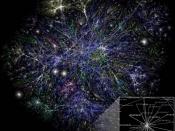We might assume that nothing new could be said about the issue of privacy beyond the basic notion that it is something secluded from the inclusion of others, a virtue and right that every citizen of a democratic society might possess. However, if that were actually the case then we would not see our culture involved in debates about the
issues regarding privacy and anonymity as they relate to new information technologies.
The primary reason for such concerns is that information has become a commodity in what we have come to know as the 'information age'. With the advent of new technologies; particularly that of the Internet this
information can be sold and exchanged quite easily. Before the use of widespread computer technologies, our personal information had no real value beyond its immediate transaction. When data and information was provided by a citizen or consumer it had no secondary reuse.
However,
due to advances in technology and data retrieval systems and
transactions, information has been given commercial value, especially with regards to the issue of who owns and controls this information. The information age has been a period that has allowed rights to privacy
to beocme seriously jeopardized by new information technologies.
Richard A. Spinello, has defined two distinct phases to the systematic
erosion of information privacy. The first he calls the 'data base
phase'. The emergence of sophisticated data base technology in the early
eighties made it possible to store and retrieve large amounts of
information efficiently and economically. During this time,
considerable amounts of personal data were transferred to computerized
records, which have been stored on record. Another implication in the
invasion of privacy has been what is described as a 'network phase', in
which many individuals and organizations are relying heavily on digital
networks such as the...


